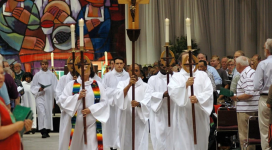The Abrahamic Fellows project for the College of Preachers at Washington National Cathedral in Washington DC, hosted a seminar led by three religious scholars who are representative of the Abrahamic faiths – Christianity, Judaism, and Islam -- from June 14-25 with the goal to end religious justifications of violence.
Three scholars led the investigation of the doctrinal, historical and psychological depths of the Abrahamic faiths: Bishop Krister Stendahl, former Dean of the Harvard Divinity School; Rabbi Marc Gopin, Laue Professor of World Religions, Diplomacy and Conflict Resolution at George Mason University; and Abdulaziz Sachedina, Ball Professor of Religious Studies at the University of Virginia.
In a joint statement, the three scholars expressed their desire to collaborate in removing any religious legitimacy for political murder. The statement reads:
“Violence in the name of God and religion calls for passionate and reasoned refutations. Our three Abrahamic traditions have their share in that sacrilege, both in history and in the present. In our respective languages, speaking from within our communities, we recognize that we are different as Jew, Christian, Muslim, and we treasure our differences as a richness. We recognize even more strongly our common call to honor and preserve the dignity and sanctity of human life.”
According to College of Preachers, the seminar was intended to avoid the interfaith dialogue tradition of appealing to universal values. Instead, Stendahl, Gopin, and Sachedina focused on reaffirming traditional values and identities of their respective religions and encouraged their fellow believers to form relationships in harmony.
Christian scholar, Stendahl, noted the crises in the Abrahamic family and the ineffectiveness of interfaith dialogues. As he pointed out the passages in the Bible that promoted peace, he emphasized the importance of loving others.
“For me as a Christian, it is now important to recognize that urgent action is called for. As a Biblical scholar, I know well the texts of Scripture that work for peace, as well as all those words that have aided and abetted Christian teachings of contempt for Jews and Muslims.
“But the present urgency brings to mind my great teacher St. Paul. In Corinth, he found conflicts among the faithful and faith-filled. Their different theologies and practices seemed to ruin the community, and so he wrote – or recited – an ode to love. It ends with the words, “so faith, hope, love abide, but the greatest of them is love.””
Criticizing the acts of violence that are performed in the name of God, Gopin urged Christianity, Judaism and Islam to come together and form boundaries of love.
He said: “We know the challenges. We know that these three children [Christianity, Judaism and Islam] must come to a place of absolute respect, equality, and a recognition of friendly boundaries between loving neighbors. We know that there are halakhic and spiritual resources within Jewish tradition, such as the mitzvah of redifat shalom, pursuit of peace, pesharah, the art of compromise, hakem takim imo, helping others in distress--even enemies, teshuvah, acknowledgement of harm done and commitments to a better future. Above all, however, there is the mitsvah to save human life. Even at a level of pure self-concern, the Jewish people must face the reality of needing coexistence in peace and justice, rather than in terminal violence with billions of Christians and Muslims.”
Addressing the Muslim community, Sachedian reminded the attendees of the critical mistake of some militant groups who are using the core message of the Koran to justify thier terrorist acts. He insisted that God has called the children of Adam and Eve to make this earth a state for just relationships and that “Jews, Christians and Muslims are called upon to bear witness to God’s mercy and establish justice and peace among all nations of the world as part of their moral-spiritual commitment.”
Referring to one passage in the Koran, he added that it is urgent for the Children of Abraham – that is, Jews, Christians, and Muslims – “to engage in creating partnerships in competing to do the good and spreading the ethics of just relationships.”
The Abrahamic Fellows has been funded by the William and Mary Greve Foundation. The project director is Joseph Montville, who serves at Center for World Religions, Diplomacy and Conflict Resolution, George Mason University, Diplomat in Residence at American University and the Center for Strategic and International Studies as a Senior Associate.







